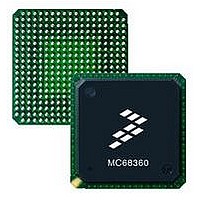MC68EN360CAI25L Freescale Semiconductor, MC68EN360CAI25L Datasheet - Page 524

MC68EN360CAI25L
Manufacturer Part Number
MC68EN360CAI25L
Description
IC MPU QUICC 25MHZ 240-FQFP
Manufacturer
Freescale Semiconductor
Series
MC68000r
Datasheets
1.MC68EN302AG20BT.pdf
(8 pages)
2.MC68EN360VR25L.pdf
(14 pages)
3.MC68EN360VR25L.pdf
(2 pages)
4.MC68EN360CAI25L.pdf
(962 pages)
Specifications of MC68EN360CAI25L
Processor Type
M683xx 32-Bit
Speed
25MHz
Voltage
5V
Mounting Type
Surface Mount
Package / Case
240-FQFP
Core Size
32 Bit
Cpu Speed
25MHz
Embedded Interface Type
SCP, TDM
Digital Ic Case Style
FQFP
No. Of Pins
240
Supply Voltage Range
4.75V To 5.25V
Rohs Compliant
Yes
Family Name
M68xxx
Device Core
ColdFire
Device Core Size
32b
Frequency (max)
25MHz
Instruction Set Architecture
RISC
Supply Voltage 1 (typ)
5V
Operating Supply Voltage (max)
5.25V
Operating Supply Voltage (min)
4.75V
Operating Temp Range
-40C to 85C
Operating Temperature Classification
Industrial
Mounting
Surface Mount
Pin Count
240
Package Type
FQFP
Lead Free Status / RoHS Status
Lead free / RoHS Compliant
Features
-
Lead Free Status / Rohs Status
Compliant
Available stocks
Company
Part Number
Manufacturer
Quantity
Price
Company:
Part Number:
MC68EN360CAI25L
Manufacturer:
APLHA
Quantity:
12 000
Company:
Part Number:
MC68EN360CAI25L
Manufacturer:
Freescale Semiconductor
Quantity:
10 000
Part Number:
MC68EN360CAI25L
Manufacturer:
FREESCALE
Quantity:
20 000
- MC68EN302AG20BT PDF datasheet
- MC68EN360VR25L PDF datasheet #2
- MC68EN360VR25L PDF datasheet #3
- MC68EN360CAI25L PDF datasheet #4
- Current page: 524 of 962
- Download datasheet (4Mb)
Serial Communication Controllers (SCCs)
7.10.19.4.2 PSMR Programming. The PSMR programming sequence is as follows:
7.10.19.4.3 TODR Programming. To expedite a transmit frame, the transmit on demand
register (TODR) may be used.
7.10.19.4.4 AppleTalk Controller Example. Except for the previously discussed register
programming, the HDLC Example #1 may be followed.
7.10.20 BISYNC Controller
The byte-oriented binary synchronous communication (BISYNC) protocol was originated by
IBM for use in networking products. The three classes of BISYNC frames are transparent,
non-transparent with header, and non-transparent without header (see Figure 7-63). The
transparent mode in BISYNC allows full binary data to be transmitted with any possible char-
acter pattern. Each class of frame starts with a standard two-octet synchronization pattern
and ends with a block check code (BCC). The end of text character (ETX) is used to sepa-
rate the text and BCC fields.
The bulk of the frame is divided into fields whose meaning depends on the frame type. The
BCC is a 16-bit CRC (CRC16) format if 8-bit characters are used; it is a longitudinal check
(a sum check) in combination with vertical redundancy check (parity) if 7-bit characters are
used. In transparent operation, to allow the BISYNC control characters to be present in the
frame as valid text data, a special character (DLE) is defined, which informs the receiver that
the character following the DLE is a text character, not a control character. If a DLE is trans-
mitted as valid data, it must be preceded by a DLE character. This technique is sometimes
called byte-stuffing.
7-200
1. The NOF bits should be set to 0001 (binary) giving two flags before frames (one open-
2. The CRC should be set to 16-bit CRC-CCITT.
3. The DRT bit should be set.
4. All other bits should be set to zero or to their default condition.
SYN1
SYN1
SYN1
ing flag, plus one additional flag).
The transparent frame type in BISYNC is not related to the total-
ly transparent protocol supported by the QUICC. See 7.10.21
Transparent Controller for details.
SYN2
SYN2
SYN2
Freescale Semiconductor, Inc.
Figure 7-63. Typical BISYNC Frames
SOH
STX
DLE
For More Information On This Product,
MC68360 USER’S MANUAL
NON-TRANSPARENT WITHOUT HEADER
NON-TRANSPARENT WITH HEADER
Go to: www.freescale.com
HEADER
STX
TRANSPARENT
NOTE
TRANSPARENT TEXT
TEXT
STX
TEXT
DLE
ETX
ETX
ETX
BCC
BCC
BCC
Related parts for MC68EN360CAI25L
Image
Part Number
Description
Manufacturer
Datasheet
Request
R
Part Number:
Description:
Manufacturer:
Freescale Semiconductor, Inc
Datasheet:
Part Number:
Description:
Manufacturer:
Freescale Semiconductor, Inc
Datasheet:
Part Number:
Description:
Manufacturer:
Freescale Semiconductor, Inc
Datasheet:
Part Number:
Description:
Manufacturer:
Freescale Semiconductor, Inc
Datasheet:
Part Number:
Description:
Manufacturer:
Freescale Semiconductor, Inc
Datasheet:
Part Number:
Description:
Manufacturer:
Freescale Semiconductor, Inc
Datasheet:
Part Number:
Description:
Manufacturer:
Freescale Semiconductor, Inc
Datasheet:
Part Number:
Description:
Manufacturer:
Freescale Semiconductor, Inc
Datasheet:
Part Number:
Description:
Manufacturer:
Freescale Semiconductor, Inc
Datasheet:
Part Number:
Description:
Manufacturer:
Freescale Semiconductor, Inc
Datasheet:
Part Number:
Description:
Manufacturer:
Freescale Semiconductor, Inc
Datasheet:
Part Number:
Description:
Manufacturer:
Freescale Semiconductor, Inc
Datasheet:
Part Number:
Description:
Manufacturer:
Freescale Semiconductor, Inc
Datasheet:
Part Number:
Description:
Manufacturer:
Freescale Semiconductor, Inc
Datasheet:
Part Number:
Description:
Manufacturer:
Freescale Semiconductor, Inc
Datasheet:











